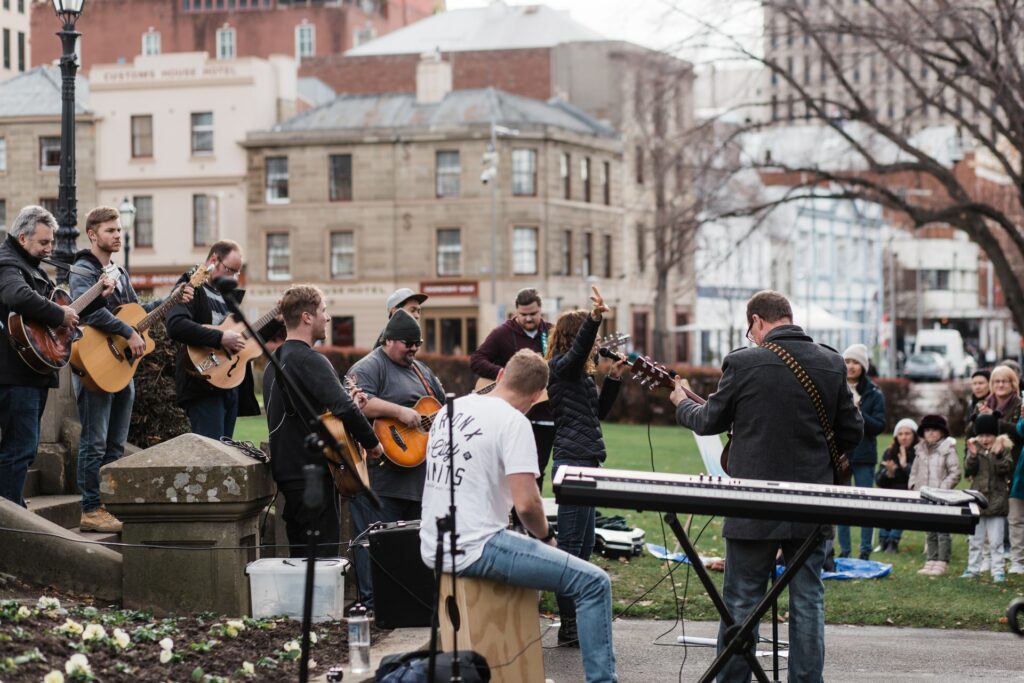Work Together to Share the Good News
Nothing is more exciting than to belong to a well-trained basketball or football team matched against an opposing team! Every team member knows that no individual can possibly win the game by himself, but each must help the other toward a common goal. Everyone does his share. All are mutually dependent upon the support of the others.
The task of evangelizing our world calls for this same kind of team effort. No one person can do it alone. God is pleased to use a team of workers in the enlarging of His church. The apostle Paul emphasized “our work together” (2 Corinthians 6:1).
You are now studying the final lesson of our first unit entitled A WORLD TO WIN—See the Need! In addition to personal soulwinning, another important dimension is cooperative evangelizing through the church. As believers are mobilized into evangelistic teams of one kind or another, soulwinning ministries multiply. Come, join a team!
GOD’S PRIMARY AGENT FOR EVANGELIZING IS THE CHURCH
During our Lord’s ministry He sent out, in teams of two, at least seventy men to thirty-five or more towns and cities in the province of Galilee. He delegated power to these team members for evangelizing, for healing the sick, and for claiming deliverance for those bound by evil spirits. The teams later returned rejoicing in their spiritual victories (Luke 10:17).
After Jesus ascended into heaven and the Holy Spirit descended upon believers on the Day of Pentecost, the young church became God’s primary agent in evangelizing. Throughout the centuries the church has continued as a vehicle for evangelizing. During certain periods of history, evangelistic efforts slowed down and nearly stopped, but at other times the Holy Spirit prompted great spiritual awakenings. As a result, multitudes have accepted Christ and have been stirred to further soulwinning.
Objective 1. Identity situations requiring church-based teamwork in evangelism.
The Early Church Grew by Evangelizing
The New Testament letters did not especially exhort believers to evangelize for the simple reason that evangelizing was a common and natural activity engaged in by all. Reading about the early church inspires us to share the Good News with others. We read that when a great persecution broke out against the church at Jerusalem, believers were scattered throughout Judea and Samaria. But they “went everywhere, preaching the message” (Acts 8:4). The word preaching meant telling the Good News.
Another persecution connected with the martyrdom of Stephen scattered believers as far away as Phoenicia, Cyprus, and Antioch in Syria. It was at Antioch, the third largest city in the Roman Empire, that believers first began to witness to Greek-speaking Gentiles, “telling them the Good News about the Lord Jesus” (Acts 11:20). These believers weren’t full-time evangelists as we know them today. They were ordinary lay believers, everyday working people, businessmen, and traders who settled in Antioch and witnessed of Christ as Savior. As a result “the Lord’s power was with them, and a great number of people believed and turned to the Lord” (Acts 11:21). The first Gentile church was thus founded in Antioch. It was here that believers, who must have been Christlike in nature, were first called Christians by outsiders (Acts 11:26).
The Church Today Must Continue Evangelizing
You have learned that evangelizing became a way of life among the early Christians. Today we must return to their method of everyone, everywhere. Real growth of the church, whether in that early period or in our generation, comes with daily evangelism. People must be born again before they can enter the family of God; they must hear that they can believe and be saved.
We see now that evangelism includes all activities directly concerned with gaining converts for Christ. Today a great variety of evangelizing methods are being used. When a group or team and some kind of organization is involved, we shall call it group evangelism. Effective group evangelism must have the help of all of us.
 City-wide evangelistic campaigns involve many churches in a given area. These may all be churches of the same fellowship, or they may represent several different denominations in a cooperative effort to reach people for Christ. These groups, with their leaders and congregations, team together to get the gospel out to as many people as possible in big meetings. Properly planned, led, organized, and prayed for, such efforts can have a tremendous impact on a community and result in many converts being added to the churches.
City-wide evangelistic campaigns involve many churches in a given area. These may all be churches of the same fellowship, or they may represent several different denominations in a cooperative effort to reach people for Christ. These groups, with their leaders and congregations, team together to get the gospel out to as many people as possible in big meetings. Properly planned, led, organized, and prayed for, such efforts can have a tremendous impact on a community and result in many converts being added to the churches.
On a more local level are evangelistic meetings conducted by a single church. Here again, believers must be enlisted to help both evangelist and pastor to make the services fruitful.
Other forms of group evangelism are conducted on a more regular basis. Some examples are as follows:
- Soulwinning teams which hold short services in hospitals, prisons, and retirement homes, or on the street or in a marketplace in the open
- Visitation teams that go from house to house to take a religious census find those who do not attend a church. Other teams visit homes where some contact or association has been made. They use these opportunities to talk to people about the gospel and to lead them to
- Gospel literature distribution teams who go out into public places such as parks, plazas, and markets, giving out free gospel tracts and perhaps samples of evangelistic correspondence courses such as are produced by ICI
All of these forms and methods of evangelism must be church-based. Inquirers of the gospel should know who is evangelizing and where they can find a local church. Every gospel tract and piece of literature distributed should be stamped with a local church address so that those seeking for truth can find further help.
EVANGELIZING INVOLVES EVERY BELIEVER
Objective 2. List three types of evangelism and evaluate your ability to participate in each.
In any evangelistic outreach of the church every believer’s support is needed in some way or another. Some of these ways in which you can assist your church are as follows:
- Face-to-face evangelizing. This is talking directly with prospective converts with the goal of leading them to Christ. It is confronting them with an appeal to be converted to Christ. It is basic evangelizing, as we have been learning it: telling the Good News, witnessing for Jesus, winning people to Him, and making disciples. It can be in the form of a one-to-one conversation, or a personal worker explaining the way of salvation to a group of inquirers after an evangelistic
- Friendship evangelizing. By this we mean indirect evangelizing by making friends with prospective converts. You might invite them to your home for a meal or a friendly chat over a cup of coffee, or find a way to be helpful to If you show that you care for them as individuals, they will more readily listen to what you tell them. Another way is through home meetings, when neighbors and friends can be witnessed to in a relaxed, friendly atmosphere. People who are reluctant to go to a church can often be reached in this way, and then brought into a church.
- Supportive evangelizing. It is important in any evangelistic outreach to have support in various areas, such as the following:
- Prayer. This is the privilege and responsibility of every member. Since conversions are a work of the Holy Spirit working in and through people, this ministry cannot be overemphasized.
- Personal attendance. By “being there” at evangelistic meetings, you show your own concern and interest and you strengthen the messenger. When prospective converts see a group of happy, loving believers who are warm and friendly to them, they will want to become a part of that group.
- Helping financially. Covering the necessary expenses is a practical way to promote evangelizing, and this always brings blessing to the giver.
Every believer has a place in evangelizing. The apostle Paul compares the relationship of the church and the Lord to a body, the head being Jesus Christ and the rest of the body with its many members being the church (Colossians 1:18). Every member needs to function in order for Christ’s work to be done.
- Which aspect of evangelism, though helpful, could be classed as less needful than the other aspects?
- Read the following passages of Scripture telling about Jesus’ ministry (left column). Match each one to the kind of relationship it best illustrates (right column).
. . . . a Luke 1l:1-4
. . . . b Luke 19:1-10
. . . . c John 4:5-26
- Friendship
- Face-to-face
- Supportive
The healthy, growing church needs two types of workers. One is the kind of volunteer workers who help to maintain the life and ministries of the local churches. Examples of these are ushers, church secretaries, janitors, Sunday school teachers, and choir members. The activity and vision of these workers is inward; their interests are inside the church. These are valuable people and every church leader is grateful for them.
workers is inward; their interests are inside the church. These are valuable people and every church leader is grateful for them.
Others seem to have more of an outward ministry, talking to people on the street, conducting jail services, handing out gospel tracts, and reaching the unsaved who either cannot or will not go to a church. The ministries God gives, however, are never totally in one area or the other. The personal worker must be supportive of the local church and the choir member must do what he can to win his neighbor to the Lord.
- List the three types of evangelism and their subpoints, if any. Draw a line under each type that you personally can become involved in.
Objective 3. Describe ways in which you can work in evangelism.
Get Experience as a Helper
To get a clearer picture of how evangelizing can involve every believer, let us step back in time to participate in an actual evangelistic crusade.
The scene is in Taichung, in central Taiwan, a large city of 500,000 Chinese. A group of volunteer workers and a missionary couple are working together. Six of the volunteer workers are Spirit-filled young people from churches in south and north Taiwan. They have given up their summer holidays to be in Taichung. Three believers assisting the team are from the local church that has been recently started.
A Spirit-filled evangelist and his wife who have been graciously used of the Lord in bringing many to Christ and in praying for the sick have been invited to come. Before their arrival much preparation for the coming meetings has to be made.
The Chinese team and the missionary couple meet together every morning for Scripture reading, prayer, and planning. Four weeks before the evangelistic meetings start, the team carefully works on the following projects:
- Advertising: The team prints large posters announcing the meetings. After obtaining permission from the city government, they place these posters on telephone poles and on public bulletin boards around They arrange for spot announcements on the radio before and during the campaign. They distribute handbills advertising the meetings and giving a simple salvation message. Before the meetings begin the missionary slowly drives a vehicle with advertising posters through the streets. The young people of the church have already prepared tapes of invitations to the meetings interspersed with music to be played as he drives along. Some of the young people riding along give handbills to people through the windows of the vehicle.
- Campaign sites: The meetings begin first in an old town hall. As the response from the people grows, the crusade moves to a large tent that a crew of men put up in the city park nearby. Here, being more in the open, the meetings attract hundreds of people. Much work had gone into the preparation—such as setting up 500 backless stools to supplement the seating. The team, along with other volunteers, arranged the electric lighting, made a temporary platform and pulpit, and erected a huge
- Personnel: As the meetings progress all the believers help distribute tens of thousands of gospel tracts and invitation pamphlets on nearby streets and Passersby are courteously urged to enter the tent area, then taken by the arm and led personally to a seat where they can see and hear all that is taking place. Three young men alternate in leading the singing and interpreting the evangelist’s message into two Chinese languages.
Helpers! The great campaign in Taichung could not have been planned and carried out without the help of many people. Those who were willing to help at the start inspired others to contribute their time, talent, and means in a joint effort that reached thousands with the Good News of salvation through Jesus Christ!
Become a Personal Worker
We have suggested that you first get experience as a helper in the cause of evangelism. As you see, in any evangelistic outreach there is something for every believer to do. The second step is to become a personal worker. A challenge awaits you as you become involved in active face-to-face evangelism.
Volunteers in the Taichung crusade became good personal workers as missionaries helped them learn to talk to people politely, to be understanding of their problems, and to lead them to faith in Christ. Each night after the evangelist preached, many people came forward for spiritual help. He carefully explained the steps of salvation and then prayed for all who responded.
Now came the personal workers’ turn to talk to people. It was not always possible to talk to each one individually. Usually one worker talked to several persons gathered around him. Each personal worker explained further the steps of salvation, answered any questions, and led the inquirers in prayer. Further counseling with those who lingered was conducted on a one-to-one basis.
Each one was handed gospel literature and asked to sign a decision slip giving both his name and his address. He was assured that later contact was only in the interest of helping him spiritually.
One of the inquirers named Mrs. Tan later told us her story. She was sitting at home early in the evening and attentively watching a serial story on the television set that was placed on an altar shelf right along side of her idol shrine. Suddenly the television picture faded as the set went dead. Disgustedly Mrs. Tan left her upstairs apartment and walked down the narrow flight of stairs to take a stroll in the nearby city park.
As she approached the main gate of the park she heard joyful singing and saw a crowd of people in a tent. Then Ma-lin, a girl in her teens, politely handed Mrs. Tan a gospel tract and asked her if she would like to come into the tent and hear the “happiness news” (the Chinese expression for the gospel). Mrs. Tan was curious as she had never heard the news before so Ma- lin guided her into the tent and helped her be seated.
The Word of God touched Mrs. Tan’s heart. She was also stirred by the singing and the happy faces of people around her. The next night she returned. This went on for several nights. Finally she went forward for prayer. A worker talked to her, prayed with her, and took her name and address. Later she responded in faith for healing of a small goiter, and the Lord took it away. Mrs. Tan found peace and joy in trusting the Savior.
EVANGELIZING INCLUDES FOLLOW-UP WORK
 Objective 4. Recognize the importance of follow-up work.
Objective 4. Recognize the importance of follow-up work.
Evangelistic campaigns are thrilling! Crowds, music, singing, anointed preaching, and people getting saved and healed! All too soon our campaign came to a close. Before the evangelist left he said, “Now you have work to do!”
What did he mean? Hadn’t everyone been working for weeks, both during and after the meetings? But evangelizing, whether done individually or as a group, must include follow-up work. Here are some ways to do this.
Have a Visitation Program
Before the Taichung crusade ended, the volunteer workers and missionaries developed a thorough visitation program. Hundreds of decision slips were sorted out and studied. Addresses were found to be misleading, as the search for inquirers began. It took days of being on foot, tramping in steady rain up and down narrow streets, lanes and courtyards, or climbing up and down the stairs of huge high-rise apartment buildings.
Through faithful visitation, new converts were encouraged in the Christian faith. Some of them welcomed prayer meetings and Bible studies under the leadership of a Chinese pastor or missionary.
Mrs. Tan was visited at her upstairs apartment. She was alone most of the time because her husband was away in the business of exporting curios. The volunteer workers taught her to pray. Later, she gave up her worship of idols. On an Easter Sunday morning she was joyfully baptized in water. More recently, when her only son died she testified to the peace and comfort of the Lord, without which she said she would have lost her mind. She now attends the local assembly in Taichung.
If it had not been for a visitation program, Mrs. Tan and others would have given in to their heathen environment. “The Son of Man came to seek and to save the lost” (Luke 19:10). Follow-up work involves persistently looking up people and wearing out your shoes doing so! Wouldn’t Jesus do that—and more?
Be a Spiritual Sponsor
When a person accepts the Lord Jesus as his Savior and receives forgiveness of sin, he is like a newborn baby. As all parents know, the baby needs to be loved, fed, and cared for. As the little child grows he needs the help of more mature believers—spiritual “parents”—in order to recognize that he is part of the family of God. You can be a spiritual sponsor, introducing him to other believers and including him in Christian fellowship.
